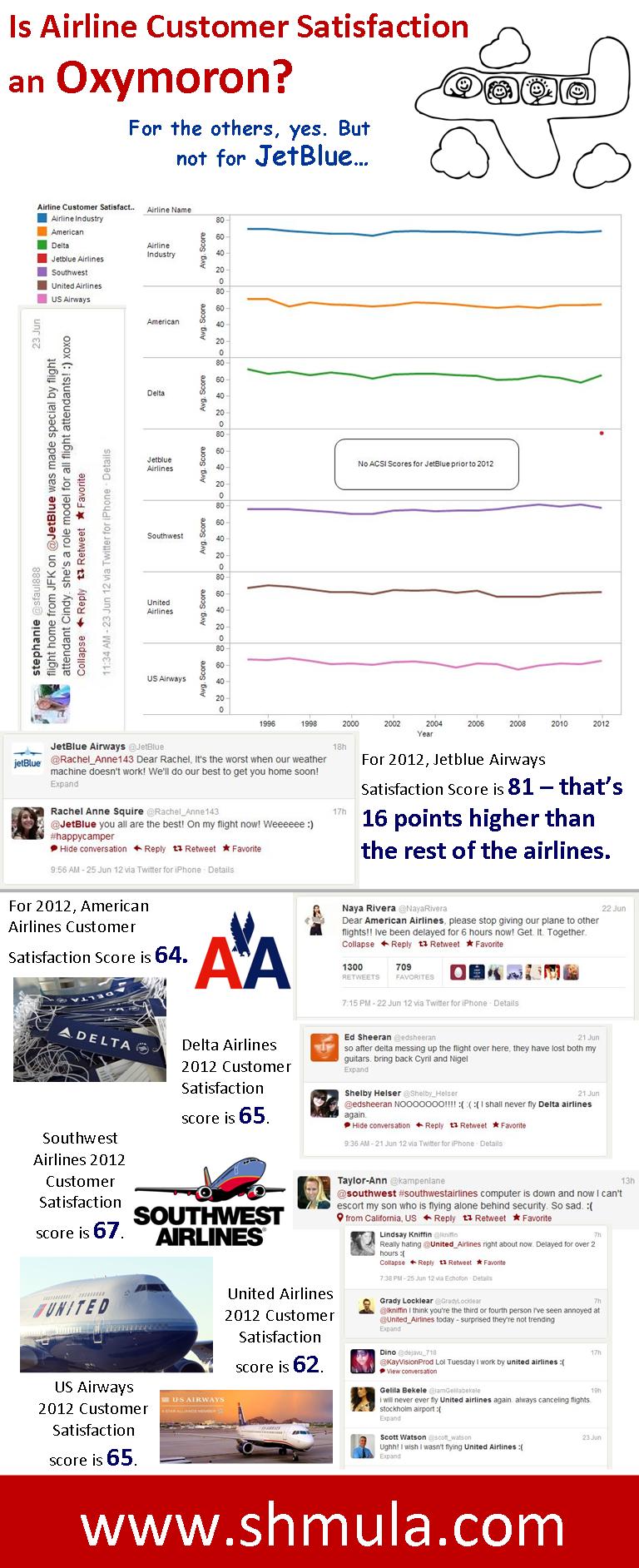This month, the American Customer Satisfaction Index (ACSI) released their annual customer satisfaction scores for the airline industry [1. the details of the article may be found here http://www.theacsi.org/index.php?option=com_content&view=article&id=213:acsi-scores-june&catid=14&Itemid=262] and the airline carriers. To no surprise, the scores were dismal, except for one that stands out. Jetblue Airways. But in total, airline customer satisfaction is not a pretty picture.
The data shows the clear difference between service and manufacturing.
Now, while it’s great for JetBlue, there are clearly several problems with the ACSI methodology:
- The Customer Satisfaction scores are released yearly. This is a problem because, at most, it’s a lagging indicator and a poor diagnostic – that is, the score doesn’t lead to any timely or relevant action or efforts around improvement. In sum, it’s just a score.
- Satisfaction, as a measure, is very, very broad. It actually doesn’t tell us much. What, exactly, does “Satisfaction” tell us anyway? Exactly – that’s my point.
Nevertheless, here are the results of the ACSI Customer Satisfaction scores for the Airline Industry, broken down by airline carrier, in a nice little infographic I created for you. Enjoy.

While the ACSI is not perfect, it does give us some insight into how the consumer perceives the airline carrier. But, in terms of a true and helpful diagnostic, the ACSI isn’t very helpful at all.








One data point? You didn’t call them on this? Southwest clearly has had several years at or above 81–perhaps not *this* year, but without a trend line there’s no way to show Jetblue as “better” in any meaningful way.
This is just another example of useless customer statifaction surveys, there is only one set of numbers that matter how many customers use your product or service, and are you capable of making money doing it at that level. Southwest will never please everyone, nor should they try to, they need to please enough customers who use their service on a regular basis son that they make money.
The we have to travel first class people will never be happy with Southwest. Nor will the I want something for free types, for them no airline will ever be cheap enough. In their field managing to keep over 60% of your customers happy is going to be doing good, and seeing they are in the high seventies always they are doing great. Most likely JetBlue if they keep up their start and do not try to become everything for everyone they will manage to keep their number up with Southwest in the high seventies to the low eighties, but the cirtical numbers will be can they keep a customer base, and can they make money in the longrun, that only time will tell.
I follow your blog often. It is usually a good source on lean principles and analytical thinking. In today’s post, thanks for pointing out the data source. However, I have to say that the graphic today is a poor representation of the data. The long aspect ratio and wide range makes it extremely difficult to see any trend in the data. If, however, you were to lay out the trellis panels side/side and sort by the mean of the rankings, you can see some very interesting things in the data. I can’t paste in the graphic, but I can send it to you if you wish. And, yes, “satisfaction” is a very fuzzy metric, but it is a measure of how the customer feels when they get off the plane, so I’d say that it is a “real” metric even if has high variability and (very likely) sample bias.
Hi Joe,
Thanks for taking the time to read shmula. I agree with you. Not only is the ACSI weak, in terms of frequency, but my representation of it in the chart can be improved a lot.
Beware of customer satisfaction indexes. What does it mean if one has a high customer satisfaction rating and is losing marketshare and not breaking even? Not creating jobs? Dr. Deming often said the most important statistics were the unknowables. Could it be these surveys are a means of self-delusion? Typically these surveys become a cost of doing business and have little value. The companies that do these market surveys are making a lot of money. If your company is desperate to save your company money get rid of customer satisfaction index surveys and employee performance appraisals and focus on CQI in deed and word and not word only. (I would recommend Dr. Deming’s 14 points one at a time to consider and apply. The ROI is astronomical.)